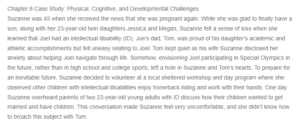Case Study- Physical, Cognitive, and Developmental Challenges
Parents of children suffering from an intellectual or developmental disability normally experience the same joy and love for their kids but they also experience an elevated risk of encountering stressors like high medical costs, depression as well as anxiety due to the emotional and unique, demanding challenges they face (Machalicek, Lang & Raulston, 2015). The level of support that such children need is different depending on the severity and nature of the disability. Still, most of the children with disabilities need support and care beyond one offered to typically developing children. Research shows that parents with children who have a disability are at a heightened risk of having relationship discord that could result in divorce (Rayan & Ahmad, 2018).
Additionally, the cost of specialized child care, early intensive intervention and the medical bills linked to many comorbid conditions could cause financial strains. Such parents may benefit greatly from formal (functional behavior assessment, home-based intervention, medical device rental, respite care, and individualized or group parent education) and informal (support group) services that can help them in raising their child. Various support groups are available to help parents of children with disabilities cope with various emotional and financial challenges and offer them the required skills to be able to raise their children. Some of these support groups include the Institute for Family-centered Care, Mommies of Miracles, Different Dream, and the Arc. Resources to aid in the learning process of their children are also available. Resources available provide emotional, physical, psychological, academic, and financial support.
Care for Children (2014) emphasizes the need to indulge in parental advocacy, empowerment, stress management, and communication to aid in nurturing a child with a disability. The social worker needs to provide the required emotional support to Joel’s parents. The social worker needs to show empathy and actively listen to the concerns of the parents. Doing so will help the social worker to identify the fears and needs of the parents. It will be important for the social worker to act as a link between the parents and any resources that they might need. This includes addressing issues with the living situation and linking parents to other parents for support. This link can help Joel’s parents know how to raise their child better and offer them hope that Joel might lead a meaningful life in the future, albeit different from other people. The parents should be encouraged to place major emphasis on Joel’s strengths and help him pursue any interests that he might have.
Joel’s parents and the local social workers could locate information that will help them advocate for the future of Joel through referrals from other parents in support groups as well as from local institutions or shelters for children with disabilities.
The right to raise children and marry is fundamental to human beings. According to the Arc (2011), young adults with disabilities have a right to make decisions regarding raising and having children and gaining access to the required support on a personal basis to help them raise these children within the confines of their own homes. As social workers, it is important to acknowledge and advocate for the rights of an individual with a disability getting married and raising children. In fact, research shows that parenting is not just about intelligence but also about getting support from informal and formal service providers as well as having the necessary financial and emotional resources to raise a family. Therefore, social workers should strive to eliminate the fear of parents regarding their children’s future as parents and strive to equip them with the necessary skills to be able to have a family of their own someday.
References
Care for Children. (2014). Social Work & Family Support Services. https://careforchildren.info/family-support-services/
Machalicek, W., Lang, R., & Raulston, T. J. (2015). Training parents of children with intellectual disabilities: Trends, issues, and future directions. Current Developmental Disorders Reports, 2(2), 110-118.
Rayan, A., & Ahmad, M. (2018). Mindfulness and parenting distress among parents of children with disabilities: A literature review. Perspectives in Psychiatric Care, 54(2), 324-330.
The Arc. (2011). Parents with Intellectual Disabilities. https://thearc.org/wp-content/uploads/forchapters/Parents%20with%20I_
ORDER A PLAGIARISM-FREE PAPER HERE
We’ll write everything from scratch
Question 
Chapter 8 Case Study: Physical, Cognitive, and Developmental Challenges
Suzanne was 43 when she received the news that she was pregnant again. While she was glad to finally have a son, along with her 23-year-old twin daughters Jessica and Megan, Suzanne felt a sense of loss when she learned that Joel had an intellectual disability (ID). Joe’s dad, Tom, was proud of his daughter’s academic and athletic accomplishments but felt uneasy relating to Joel. Tom kept quiet as his wife Suzanne disclosed her anxiety about helping Joel navigate through life.

Case Study- Physical, Cognitive, and Developmental Challenges
Somehow, envisioning Joel participating in Special Olympics in the future, rather than in high school and college sports, left a hole in Suzanne and Tom’s hearts. To prepare for an inevitable future, Suzanne decided to volunteer at a local sheltered workshop and day program where she observed other children with intellectual disabilities enjoy horseback riding and work with their hands. One day Suzanne overheard parents of two 23-year-old young adults with ID discuss how their children wanted to get married and have children. This conversation made Suzanne feel very uncomfortable, and she didn’t know how to broach this subject with Tom.
What resources exist for parents who have children with intellectual or developmental disabilities?
How can social workers talk with Joel’s parents to assure them there is hope for Joel living a meaningful life?
Where might Joel’s parents and local social workers locate policy information to help them advocate for Joel in the future?
How would social workers respond to the idea of young adults with ID wanting to get married and raise children?